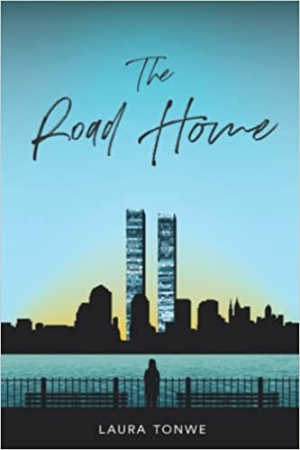The Road Home
In the evocative novel The Road Home, a traumatized woman starts the long process of belonging.
Set in the aftermath of September 11, 2001, Laura Tonwe’s rich novel The Road Home is a story about healing.
After college, Stephanie, who loves the movies, moves to New York City for a behind-the-scenes job as a media solutions engineer. There, she sees the September 11 attacks up close. The destruction causes lasting trauma in her life. In addition to those challenges, she’s estranged from her sick father, and she dislikes her mother’s new husband.
At work, Stephanie begins a relationship with her unstable boss, whose mistakes she covers up. When she’s promoted, she begins answering to a different predatory boss. A business trip to California finally affords her new opportunities, though.
A sense of in-betweenness dominates the novel, which begins and ends at tourist sites in New York City; between these stops, it is occupied by ghosts from the movies and television shows that Stephanie appreciates, but who are under contextualized in the story itself. Stephanie herself floats through the book’s scenes—at first drifting from drunken dates to watching movies alone in her apartment, and later between uncomfortable meetings at work in which she’s told to keep quiet. When she’s back home in Michigan, her sense of estrangement deepens as her family members debate politics over her, and as a reconnection with an ex-boyfriend punctuates her feelings of emptiness.
Throughout the novel, Stephanie struggles to communicate, even in the midst of conversations with others; it’s a point of pain. She discusses more with her ghosts than anyone else; she proclaims to be fine, but screams on the inside. When she finally realizes that she has nothing to lose, she speaks her mind, and hope that her transformation will continue is introduced.
The story distinguishes itself by being a self-conscious product of an era. Stephanie’s observations are cinematographic, and she takes note of Los Angeles’s glamour and New York City’s grit in vibrant terms, as much as she does of the drabness that she notes in the bars and houses back home. In the aftermath of the attacks, Stephanie also notes that there are fewer people on New York City’s streets, which are nonetheless dirtier than usual and under high security; the impact is otherworldly. Her ghosts serve as foils for the real, but superficial, people who surround her; they goad her toward change. And as she works behind the scenes to help the media that formed her come to life, her own complementary moves toward personal emergence are poignant.
In the evocative novel The Road Home, a traumatized woman starts the long process of belonging.
Reviewed by
Mari Carlson
Disclosure: This article is not an endorsement, but a review. The publisher of this book provided free copies of the book and paid a small fee to have their book reviewed by a professional reviewer. Foreword Reviews and Clarion Reviews make no guarantee that the publisher will receive a positive review. Foreword Magazine, Inc. is disclosing this in accordance with the Federal Trade Commission’s 16 CFR, Part 255.

